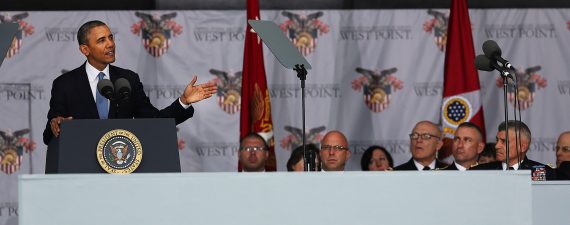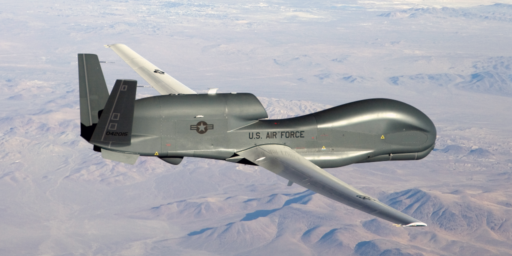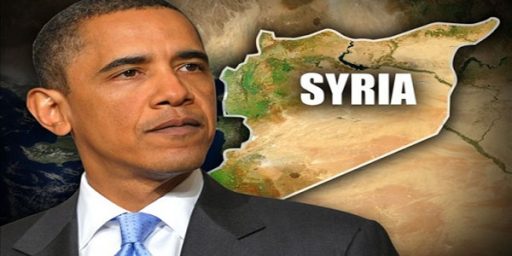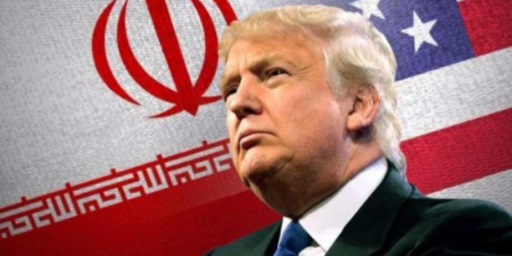Obama’s Cloudy Foreign Policy Vision
Once again, President Obama's attempt to communicate a foreign policy vision falls short.
Yesterday, President Obama spoke before the graduating class of the United States Military Academy at West Point and laid out what was promised in advance would be his vision for American foreign policy going forward, which turned out to be largely platitudes and the President’s vision was, to say the least, very cloudy:
WEST POINT, N.Y. — President Obama tried once more to articulate his vision of the American role in the world on Wednesday, telling graduating cadets here that the nation they were being called to serve would seek to avoid military misadventures abroad, even as it confronts a new set of terrorist threats from the Middle East to Africa.
Speaking at the commencement of the United States Military Academy, Mr. Obama disputed critics who say his cautious response to crises like Syria’s civil war and Russian aggression toward Ukraine had eroded America’s leadership in the world. Those critics, he said, were “either misreading history or engaged in partisan politics.”
But for a president who has promised to take the United States off a permanent war footing, Mr. Obama painted an unsettling portrait of the world, 13 years after the attacks of Sept. 11, 2001. The nation, he said, had, in effect, traded Al Qaeda in Afghanistan for a more diffuse threat from extremists in Syria, Nigeria, Somalia, Yemen, Mali and other countries.
A day after announcing that the last American soldier would leave Afghanistan at the end of 2016, Mr. Obama told a new class of Army officers that some of them would be sent on murkier missions, helping endangered nations deal with their own terrorist groups.
In the only new policy announcement of the speech, he called on Congress to finance what he called a Counterterrorism Partnerships Fund, with up to $5 billion to provide training in these operations to vulnerable countries like Iraq, Lebanon and Turkey, all neighbors of Syria.
“We have to develop a strategy that matches this diffuse threat; one that expands our reach without sending forces that stretch our military too thin, or stirs up local resentments,” Mr. Obama declared. “We need partners to fight terrorists alongside us.”
The president has spoken before about the threat from terrorism, most notably in a speech last May at the National Defense University. But on those occasions he had taken pains to note that the threat was on a lesser scale than the Sept. 11 attacks and could be dealt with “smartly and proportionately.”
On Wednesday, his language was more ominous: “For the foreseeable future,” he said, “the most direct threat to America at home and abroad remains terrorism.”
(…)
Weeks in the drafting, the president’s speech was meant to be a wide-ranging rebuttal to critics who say he should have done more to curb the bloodshed in Syria or stop Russia’s takeover of Crimea. But it also rejected arguments that the United States should retreat from its post-World War II centrality in global affairs.
Mr. Obama instead called for a middle course between isolationism and overreach, citing the international coalition the United States had mobilized to counter Russia’s aggression in Ukraine as an example of how to use American muscle “without firing a shot.”
“America must always lead on the world stage,” the president said. “But U.S. military action cannot be the only — or even primary — component of our leadership in every instance. Just because we have the best hammer does not mean that every problem is a nail.”
Mr. Obama instead called for a middle course between isolationism and overreach, citing the international coalition the United States had mobilized to counter Russia’s aggression in Ukraine as an example of how to use American muscle “without firing a shot.”
(…)
The president once again pledged to be more open about America’s secret wars, saying that drone strikes “like those we’ve carried out in Yemen and Somalia” need to be explained publicly to counter militant propaganda. He did not mention Pakistan, which for a decade has been the epicenter of America’s drone wars, but where the United States government still considers the strikes, carried out by the C.I.A., a covert action. But he reiterated a vow to transfer the drone strikes and other counterterrorism operations from the C.I.A. to the Pentagon, a pledge he made a year ago, but which has been unfulfilled because of turf fights and congressional resistance.
Mr. Obama has been deeply frustrated by the criticism of his foreign policy, which during his first term was generally perceived as his strong suit. He has lashed out at critics, whom he accuses of reflexively calling for military action as the remedy for every crisis.
On a trip to Asia last month, Mr. Obama described his foreign policy credo with a baseball analogy: “You hit singles, you hit doubles; every once in a while we may be able to hit a home run.” But, he added, the overriding objective is to avoid an error on the scale of the Iraq war.
In private conversations, the president has used a saltier variation of the phrase, “don’t do stupid stuff” — brushing aside as reckless those who say the United States should consider enforcing a no-fly zone in Syria or supplying arms to Ukrainian troops.
In a piece analyzing the President’s speech, Peter Baker of The New York Times continues with the theme of Obama using the speech mostly to respond to his critics:
Stung and irritated, Mr. Obama used his commencement address to West Point cadets on Wednesday to mount a sustained rebuttal and to define an approach to foreign policy that he believes is suited to a new era and that he hopes will outlast his presidency.
“This is an attempt to come up with an Obama doctrine that looks at how do we think about the world now that the war against the Taliban and its allies is won,” said Peter L. Bergen, a national security scholar at the New America Foundation and one of several foreign policy specialists invited to lunch with Mr. Obama this week. “A policy of judicious restraint is not very stirring and doesn’t lend itself to strong rhetoric, but it may be the most sensible approach and is certainly where the American public is.”
Mr. Obama framed the debate on his own terms at West Point, presenting himself as the steward of a reasonable balance between isolationism and unilateralism. He tried, as he often does, to capture a middle ground of sorts. He even played to both sides with his language, using the phrases “indispensable nation,” a favorite of Democrats during the Clinton administration, and “American exceptionalism,” a favorite of Republicans ever since.
But the commander in chief who in his first term waged a relentless drone campaign against terrorists and dispatched the Navy Seals who killed Osama bin Laden seemed more intent on setting the bar higher for future use of force.
By pulling troops out of Afghanistan by the end of 2016, much as he already has done in Iraq, he noted that he will have ended America’s involvement in two wars. By training and equipping regional allies, he is increasingly turning the war with terrorists over to them.
In the future, when the United States is not directly threatened, “the threshold for military action must be higher,” Mr. Obama said. He presented the choice in binary terms, suggesting that his critics want to use force to solve many of the world’s troubles.
In some ways, that was a straw-man argument, since even his fiercest opponents do not advocate American ground forces to counter Russian intervention in Ukraine or to stop the civil war in Syria. But some critics say Mr. Obama seems to have grown more allergic to American power since his own intervention in Libya yielded a messy outcome.
(…)
He did not convince his critics. Peter D. Feaver, a former aide to President George W. Bush and a professor of political science at Duke University, said the speech seemed “highly partisan and defensive in tone.”
Richard N. Haass, who also worked in the Bush administration only to break with it over the Iraq war, said the speech tried to “split the difference” between those who think America is doing too much and those who think it is doing too little. “But it didn’t articulate a rationale for what we should be doing,” said Mr. Haass, now president of the Council on Foreign Relations.
R. Nicholas Burns, who was under secretary of state for Mr. Bush, was more impressed, calling the speech “sincere and well said.” He added: “He’s right to say it’s now time to return to normalcy and he set the bar for military action appropriately at a very high level.”
Reporters have already noted that the speech seemed to get an “icy” reception from the cadets in the audience, although I’m not sure it’s possible to make a judgment about how they viewed it based on their lack of enthusiastic responses during the speech.. Meanwhile, judging from the reaction on the editorial pages of the major American newspapers, it doesn’t appear that the President’s speech was all that impressive to those listening. Consider this from The New York Times:
In his speech, Mr. Obama tried to push back against critics who say he has ceded America’s post-World War II dominance. The question, as he correctly put it, is “not whether America will lead but how we will lead” and he reasserted that “isolationism is not an option.” Mr. Obama was right when he suggested there would be no serious negotiations over Iran’s nuclear program without his approach to American leadership.
But he provided little new insight into how he plans to lead in the next two years, and many still doubt that he fully appreciates the leverage the United States has even in a changing world. Falling back on hackneyed phrases like America is the “indispensable nation” told us little.
The president said he wanted to spend $5 billion to train and support armies in places like Libya, Mali, Yemen and Somalia to combat terrorists. The aim is to avoid having to use American troops, and, in theory, it makes sense. But the United States has a checkered history in such endeavors, and Mr. Obama made only a cursory mention of other factors crucial to success, including responsible governance and education for all. It was disturbing to hear him gloss over the return of military rule in Egypt.
Mr. Obama’s talk of the need for more transparency about drone strikes and intelligence gathering, including abusive surveillance practices, was ludicrous. His administration had to be dragged into even minimal disclosures on both topics. Just Tuesday, the administration said it wanted to make further deletions from a legal memo on drone strikes that a court ordered it to make public.
The Washington Post was, if anything, even harsher:
In his address Wednesday to the graduating cadets at West Point , Mr. Obama marshaled a virtual corps of straw men, dismissing those who “say that every problem has a military solution,” who “think military intervention is the only way for America to avoid looking weak,” who favor putting “American troops into the middle of [Syria’s] increasingly sectarian civil war,” who propose “invading every country that harbors terrorist networks” and who think that “working through international institutions . . . or respecting international law is a sign of weakness.”
Few, if any, of those who question the president’s record hold such views. Instead, they are asking why an arbitrary date should be set for withdrawing all forces from Afghanistan, especially given the baleful results of the “zero option” in Iraq. They are suggesting that military steps short of the deployment of U.S. ground troops could stop the murderous air and chemical attacks by the Syrian regime of Bashar al-Assad. They are arguing that the United States should not be constrained by Cyprus or Bulgaria in responding to Russia’s invasion and annexation of parts of Ukraine.
To those doubters, the president’s address offered scant comfort. Reiterating and further tightening a doctrine he laid out in a speech to the United Nations last fall, Mr. Obama said the United States should act unilaterally only in defense of a narrow set of “core interests,” such as the free flow of trade. When “crises arise that stir our conscience or push the world in a more dangerous direction,” he said, “we should not go it alone.”
This binding of U.S. power places Mr. Obama at odds with every U.S. president since World War II. In effect, he ruled out interventions to stop genocide or reverse aggression absent a direct threat to the U.S. homeland or a multilateral initiative. Those terms would exclude missions by previous administrations in places such as Somalia and Haiti and Mr. Obama’s own proposal to strike Syria last year— but not the war in Iraq, which was a multilateral campaign.
While I tend to disagree with the interventionist tone that the Times and Post editorials take, it’s hard to disagree with their assessment of his speech, a speech that is in many a ways a metaphor for his foreign policy throughout his Presidency.
When it comes to foreign policy, President Obama has clearly failed to live up to the promise that was implicit in his campaign and election in 2008. Far from restoring American credibility in the world in the wake of the Bush Administration’s Iraq War and War On Terror policies, he has instead doubled down on many of them while at the same time implementing other policies that seem to lack any clear vision at all. At the same time he was moving forward with the process of completing the American disengagement from Iraq, for example, he quite literally doubled down on the War in Afghanistan with a “surge” strategy that didn’t really seem to make any sense from the beginning. We had gone into Afghanistan with the mission of locating and destroying al Qaeda and beating back the Taliban government that had harbored the terrorist organization. That mission was quite successful even before Obama took office, but at some point our mission turned into one designed to prop up the government in Kabul and fight Karzai’s civil war for him. The War On Terror, meanwhile, shifted tactics to a drone war that, while successful in many respect, has also resulted in countless civilian casualties that have helped to stir up resentment against the United States in Pakistan and elsewhere. In 2011, with the Arab World caught up in a string of political protests, he joined in a European mission to aid the rebels in Libya without asking Congress despite the fact that Libya posed no credible threat to the United States. When the regime in Tripoli fell, he did little if anything to follow-up, and the current chaos in Libya stands as a stark argument against the entire western policy toward the Libyan Civil War. More recently, the President was seemingly pushed into a foolish effort to force military action against Syria by complaints from the likes of John McCain and displayed a public reticence on the situation in Ukraine that has left both opponents and supporters confused as to exactly what he has in mind.
Lacking throughout all of the events of the past five years has been anything approaching a vision of American foreign policy. One could perhaps argue that the ever expanding drone war and the capture of Osama bin Ladem were part of some over-arching “War On Terror” vision, but those policies were, to a very significant degree, continuations of Bush Administration policy so it’s hard to see how Obama gets credit for that. When you look at everything else, though, it’s hard to see what direction the President wanted to take. The surge in Afghanistan seemed more like his realization that he had to fulfill a campaign promise about concentrating on the “good war” than anything else. To the extent there was a justification for the intervention in Libya, it involved the so-called “Responsibility To Protect” doctrine, but the fact that the Administration avoided intervention in other conflicts where the human rights crisis was far worse, such as Syria, made clear that this doctrine was little more than words and certainly not the basis for a coherent foreign policy.
The same is largely true of the speech at West Point yesterday, and as Daniel Larison notes, the entire speech seems to have been rather pointless.
As expected, Obama’s commencement speech at West Point contained very little new or interesting, rehashed many familiar boilerplate arguments about U.S. “leadership,” the “indispensable nation,” and American exceptionalism, and trotted out caricatures of opposing positions to use as foils for the rest of Obama’s remarks. If we judged it solely as a commencement address to West Point graduates, it would probably be viewed as a well-delivered but largely uninspired recitation of some basic liberal internationalist themes combined with a survey of current administration policies. Judged against the expectations that the White House set for the speech (a “broad vision,” the start of a new “foreign policy offensive”), it has to be considered a weak effort.
It will persuade no one that wasn’t already on board with the vast majority of what Obama has done, and that leaves a great many people unsatisfied. It was inevitable that hawkish critics would find nothing to like in the speech, since they were the main target, but this time even they have a point that Obama was arguing against positions that virtually no one holds. It seems that most people who heard the speech came away feeling underwhelmed.
That’s not surprising, of course, because underwhelming is a good description for the entire Obama foreign policy.







He should have talked about how proud he is of his accomplishments like Hillary just did in here book.
So the Washington Post is calling McCain and Butters strawmen???
I don’t know…for a topic as broad and non-specific as foreign policy, it seems pretty clear to me.
I’m far more interested in the actual results of what you and your ODS call “cloudy”.
For instance:
http://www.reuters.com/article/2014/05/23/us-iran-nuclear-iaea-idUSBREA4M0HQ20140523
If this is the result of being “cloudy”…I say let it rain.
@C. Clavin: Well OK, so what he’s doing is working and we’re all safer; but what about his duty to posture and bluster to make me feel exceptional?
Reading that first link I’m reminded of how much I hate the NYT’s snotty opinion-disguised-as-objectivity style of journalism. Once you recognize its stink, it’s hard to miss it.
I don’t have a problem with the president’s statement of principles. I’m a little fuzzy on how the principles relate to the practice.
@gVOR08:
I do feel exceptional.
You should do a caption of that picture. Some of those folks look like they are about to explode with rage.
“Underwhelming” as it is, it remains preferable to the hawkish stuff coming from his political opponents, which is overwhelming in its abject stupidity.
If I might summarize the reaction of many who generally support Obama, to that concluding paragraph:
What else is new? Nearly 6 years of unbridled opposition to nearly everything President Obama does leaves me completely not-shocked and not-surprised with the notion that Obama’s critics are unsatisfied with his recent speeches on foreign policy.
As for his hawkish critics? Please – these were the same people who opposed him when he went to Congress to get authority to bomb Syria if necessary, and now they’re complaining that Putin is trying to manage that situation?
Someone called Obama’s speech “magnificently sane”.
After Dick (and George, who couldn’t say no to Dick) sanity should be treasured.
David Corn:
It may well have seemed pointless.
But Obama did as good a job as anyone could defending his policies.
Its the policies themselves that are the problem.
@ Florack
Still sulking about the missed opportunities for war with Russia and Iran?
I’d rather have a POTUS who didn’t think we needed to “Bomb, Bomb, Bomb, Bomb”.
Just keep us out of war. And send a stiff note to all the armchair soldiers at the Washington Post pointing out that maybe they should put their money where their mouths are and ENLIST.
I guess the wingnuts learned nothing of the demise of the Soviet empire. An overwrought reliance on violence and force to maintain their empire were the very things that caused it to collapse.
The wingnuts brayed for decades about the big bad soviet bear that would destroy us because of their superior armies, weapons, etc,- that the USA was being outspent and outgunned because of the pussy liberals from LBJ to Carter and that the mighty Russians were poised to bury us because of their commitment to fund their war machine.
Well, the USSR is over and done and the “right makes might” ideology won the Cold War.
And the wingnut response? Imitate the old USSR in building up defense beyond all logic, then watch as the military industrial complex destroys your society.
@anjin-san:
And Syria.
Many conservatives were so smiitten with Putin that – rather than authorize Obama to get involved in the Syrian Civil War – they were willing to let Putin take the lead, then they could later disingenuously complain that Putin, and not Obama, was taking a leadership role there.
Any policy that ticks off those brave Keyboard Kommandos who were so gung ho about the Iraq debacle can’t be all that bad…
@Eric Florack:
So you would rather engage Iran in war???
@Eric Florack:
I’ve seen your website.
Your biggest problem with Obama is that he is black.
@al-Ameda: I’m curious about something, where does this notion President Obama was “prevented” from destroying the Syrian regime come from?
There was nothing and no one who could have stopped him if he decided to give the orders.
They would have been carried out.
That’s why Vladimir Putin advised Bashar Assad (and Assad agreed) to surrender his chemical weapons.
The absolute worst possible outcome for the Administration would have been a split Congress with the Republican House opposed and the Democratic Senate in favor, and frankly I think there was a real possibility the House would have in the end voted to support it as well, however since Assad surrendered there was never a vote.
I am mystified though as to why there seems to be this insistence that what did not happen did not happen because of what did not happen.
@C. Clavin: Oh, nonsense.
The problem with Obama is he’s a far leftist. Witness… I had much the same problem with Jimmy Carter and for the same reason. Is there something about Carters racial background we don’t know about? Please, share.
Meanwhile, its a measure of how desperate the left is, that the first defense you fall to is “you only object to Obama because you’re a racist”.
@al-Ameda: were you weeping when the dems did the same to Bush? probably not, and they actually voted for the wars……before they were against them…..or something lame like that.
obama’s weak- and he makes us all look weak on the global scale, deal with it. “underwhelming” could be the title of his second term, he took the “lame duck” thing a bit too literally.
@reader: are you questioning the dreaded “red line” statement about assad gassing his people? or how he did nothing about it, just allowed kerry to fumble the ball so they could shirk responsibility……and make putin the “hero”?!
If only he would start a few wars, and lose them – piling up body counts and wasting trillions in national treasure in the process. Then we would be strong again.
@Eric Florack:
That’s your ODS…and your bigotry. I’ve seen your website, you racist.
Obama is more Conservative than Reagan.
@Eric Florack:
I’ve been to your website…so actually the first thing I think whenever I see your name is;
It really doesn’t matter what the topic is.
@bill: Putin is a hero to traitors.
President Obama’s redline statement and subsequent military threat resulted in Syria’s agreement to surrender it’s chemical weapons.
It seems you hate American success.
@Eric Florack: I have to say that I visited your site for the first time in a while today and am disappointed. While I didn’t particularly agree back then with many things you said, I was impressed with your skill as a raconteur and liked your writing style. It reminded me of my past life as a produce warehouseman and day laborer (while I was in grad. school) and the nostalgic feeling of your posts from on the road made the whole thing interesting and colorful.
Today’s visit showed a staff of writers interested mostly in snark and Obama Derangement Syndrome. It’s not worth reading any more. That’s too bad.
@Just ‘nutha ig’rant cracker: Additional to Eric: Maybe you should go back to working for a living so that you can reattach to the roots of your writing. It appears that you work as a blogger and editor for other bloggers now.
@bill:
Did I miss something here? Did President Obama use a false pretext (like WMDs and possible “mushroom clouds”) to get us into a war where we lost 4,000 American lives, wasted over $2 trillion and counting, and ceded power in that region to Iran? Because, if Obama did that then you’re right, I should be all about criticizing him and his foreign policies.